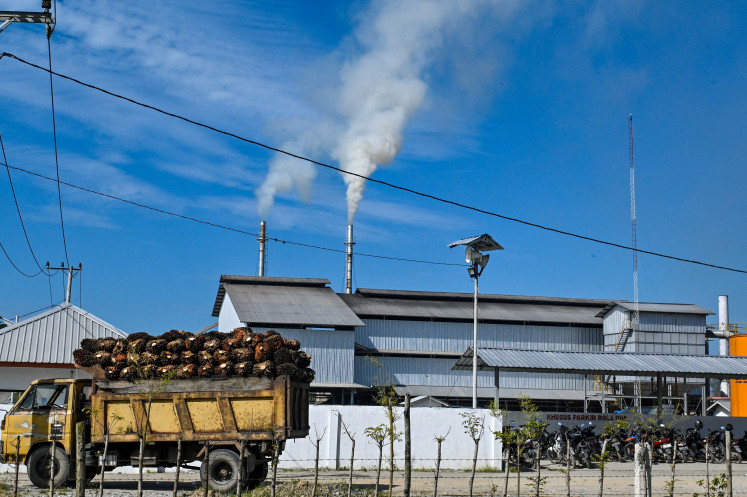Popular Reads
Top Results
Can't find what you're looking for?
View all search resultsPopular Reads
Top Results
Can't find what you're looking for?
View all search resultsInner city toll road plan: Poor logic
Howls of protest are mounting against a plan to construct six new elevated inner-city toll roads in Jakarta, with critics now saying the plan does not make any sense
Change text size
Gift Premium Articles
to Anyone
Howls of protest are mounting against a plan to construct six new elevated inner-city toll roads in Jakarta, with critics now saying the plan does not make any sense.
The Jakarta Transportation Council (DTKJ) has urged Governor Joko “Jokowi” Widodo to scrap the plan, which was approved by his predecessor Fauzi Bowo, saying it will have no positive effect on eradicating the city’s traffic problems.
“Simply put, the plan will only encourage people to use private vehicles instead of public transportation. It leads us in the wrong direction,” DTKJ chairman Azas Tigor Nainggolan told reporters at its office in Central Jakarta on Tuesday.
Azas said the project, predicted to cost Rp 42 trillion (US$4.3 billion) in total, would have a number of adverse effects, including worsening spatial management, more pollution and damage to environment and public health.
The elevated toll road project, which was initiated by PT Jakarta Tollroad Development (JTD), is expected to begin next year and will be carried out in four phases.
The first phase of construction will include the 17.8-kilometer route from Semanan, West Jakarta, to Sunter, North Jakarta, and the 11-kilometer route from Sunter to Bekasi.
The second phase includes roads from Duri Pulo, Central Jakarta, to Kampung Melayu, East Jakarta, and from Kampung Melayu to Kemayoran, East Jakarta.
The third construction phase will link Ulujami, South Jakarta, to Tanah Abang, Central Jakarta and the fourth will connect Pasar Minggu, South Jakarta, to the Casablanca area in South Jakarta.
Jokowi said he needed time to thoroughly look into the plan before making any decisions.
Elisa Sutanudjaja, an urban planning expert at Tarumanegara University and an activist at the Rujak Center for Urban Studies, said the plan was based on poor logic.
“These roads will be built above existing roads and railway lines. Why not just use the money to elevate the railway lines or double the tracks? It would make more sense,” Elisa said.
Yoga Adiwinarto, director of the Institute for Transportation and Development Policy (ITDP) Indonesia, said that it would be better to spend the funds on improving the Transjakarta Bus Rapid Transit (BRT) system.
“Our calculations show that Rp 42 trillion can be used to cut waiting times down to two minutes, triple the BRT’s current passenger capacity, build larger bus shelters, integrate existing minibus networks to the BRT system and provide the BRT for free the next 20 years,” Yoga said.
ITDP studies, he said, showed that inner-city highway construction had been considered an obsolete measure in a number of developed countries because highways designed for larger transport vehicles, could not be used to move people efficiently as most urban trips covered short distances, generated more traffic and had negative impacts on property values.
According to media reports, city-owned enterprises collectively hold the majority of shares in JTD, namely, PT Jaya Real Property (22,5 percent), PT Pembangunan Jaya Ancol (20 percent), PT Jaya Konstruksi (16 percent), PT Pembangunan Jaya (9 percent), PT Jakarta Propertindo (7 percent) and PT Jaya Land (3.5 percent).










